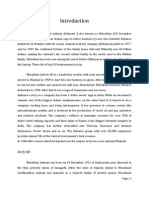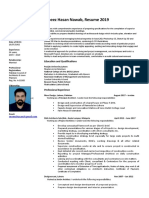Case Study on Dhirubhai Ambani: The Visionary
Industrialist
Dhirubhai Ambani, the founder of Reliance Industries, is widely
regarded as one of the most influential industrialists in India. His
life and work have become an inspiration for countless
entrepreneurs, particularly for his ability to build a multi-billion-
dollar empire from humble beginnings. Born in 1932 in the
small town of Chorwad, Gujarat, Ambani’s early years were
marked by financial hardship. However, he displayed a keen
sense of business from a young age. In the late 1950s, he moved
to Yemen and worked as a clerk for an oil company, where he
learned the basics of international trade and finance. His time in
Yemen shaped his future aspirations, and by 1958, Ambani
returned to India with the aim of creating his own business.
He began with a small trading venture dealing in spices and
textiles, but his breakthrough came in the textile industry when
he launched the brand "Vimal." Through innovative marketing
strategies, Ambani revolutionized the textile market by
bypassing middlemen and selling directly to consumers. This
allowed him to offer high-quality fabrics at lower prices and
build a loyal customer base.
In 1966, Dhirubhai Ambani established Reliance Commercial
Corporation, which later became Reliance Industries. Initially
focused on textiles, Reliance quickly expanded into various
sectors, including petrochemicals, telecommunications, and
retail. Ambani’s strategic approach to business, which included
diversification and vertical integration, helped Reliance grow
�into a conglomerate with a presence in numerous industries. One
of his most significant achievements was his ability to raise
capital for his ventures. By taking Reliance public in 1977,
Ambani successfully tapped into the capital markets, raising
funds that helped the company expand rapidly. The IPO was
oversubscribed, signaling the public’s confidence in Ambani’s
leadership and business acumen. This marked the beginning of
Reliance’s journey toward becoming one of India’s largest and
most profitable companies.
Ambani’s business practices were groundbreaking for their time.
He was a pioneer in embracing technology and scaling up
operations. Under his leadership, Reliance became a global
leader in petrochemicals and refining, particularly after the
construction of the world’s largest grassroots refinery in
Jamnagar, Gujarat. Ambani’s vision of large-scale operations
enabled Reliance to dominate markets and reduce costs, giving it
a competitive edge.
He also understood the importance of government relations and
successfully navigated India’s complex regulatory environment,
securing favorable policies that supported industrial growth.
Ambani’s ability to innovate and adapt to changing market
conditions allowed him to stay ahead of the competition and
expand Reliance’s footprint across the globe.
However, Ambani’s career was not without challenges. His
aggressive business practices and rapid expansion led to
accusations of monopolistic behavior. He faced criticism for
using his political influence to secure favorable policies and
regulatory approvals. After Ambani’s death in 2002, his family,
particularly his sons Mukesh and Anil Ambani, became
�embroiled in a bitter dispute over control of Reliance Industries.
The division within the family led to the splitting of the
company into two entities. Despite the controversies, Dhirubhai
Ambani’s legacy as a self-made billionaire continues to inspire
entrepreneurs around the world. His ability to build a global
empire from scratch, his innovative business strategies, and his
relentless drive for success have left an indelible mark on the
Indian economy.
Dhirubhai Ambani’s life is a remarkable story of
entrepreneurship, vision, and resilience. His journey from a
small-town boy to the founder of one of the world’s most
successful conglomerates demonstrates the power of persistence,
innovation, and strategic thinking. Ambani’s leadership
transformed Reliance Industries into a global powerhouse, and
his ability to scale operations, embrace technology, and diversify
into new industries set new benchmarks for corporate success in
India. While his career was not without its challenges,
Dhirubhai’s impact on the Indian economy and business world
remains profound, and his story continues to inspire future
generations of entrepreneurs to think big, take risks, and create
lasting change.
valuateyour key Take aways from the above case
Dhirubhai Ambani’s journey from modest beginnings to
creating one of India’s largest conglomerates provides several
valuable lessons for entrepreneurs. One of the key takeaways is
the importance of diversification and scalability. Ambani’s
ability to grow Reliance Industries from a textile business to a
global leader in sectors like petrochemicals,
telecommunications, and retail highlights how expanding into
�various industries can safeguard a business against risks and
create new growth opportunities. His innovative approach in the
textile industry, where he bypassed middlemen and directly
engaged with consumers, revolutionized the market and created
strong brand loyalty. This strategy demonstrates the importance
of thinking outside traditional business models and reaching
customers directly to offer more value.
Ambani also emphasized the power of financial leverage, as
seen when Reliance went public in 1977. The successful IPO not
only provided much-needed capital but also validated his
leadership and business strategy in the eyes of investors. This
showcases the critical role of capital markets in funding
business expansion.
Another significant takeaway is Ambani’s embrace of
technology and scale. His construction of the world’s largest
refinery in Jamnagar stands as a testament to his belief in large-
scale operations to reduce costs and dominate markets.
Additionally, Ambani’s ability to navigate India's complex
regulatory environment and build strong relationships with the
government was crucial in his success.
However, Ambani’s career wasn’t without challenges. His
aggressive business strategies often invited criticism, and his
eventual family dispute over control of Reliance after his death
reveals the complexities that can arise in businesses of such
scale. Despite these issues, his legacy teaches that persistence,
adaptability, and a forward-thinking approach to business
can help overcome obstacles and create a lasting impact.





















































































